The WGA was the first Hollywood union to go on strike this year. They set off a chain-reaction which led to the still on-going SAG-AFTRA strike and the larger “hot labor summer” of workers’ rights and strikes across the board. Incidentally, the DGA – the directors’ union – made their deal with AMPTP before the WGA went on strike, and there’s been some conversation about how the DGA likely got screwed in their deal simply because they didn’t have the appetite to go on strike. There was also a lot of conversation about AMPTP’s desire to draw out the SAG and WGA strikes until union members lost their houses and were broke and starving. Well, a tentative deal has been reached between WGA and AMPTP.
Hollywood heaves a sigh of relief. The WGA and major studios and streamers have reached a tentative agreement on a new three-year contract that promises to end the 146-day strike that has taken a heavy toll across the content industry.
Negotiators for the Writers Guild of America and Alliance of Motion Picture and Television Producers reached the finish line Sunday after five consecutive days of negotiations. Day 4 on Saturday mostly involved lawyers for the guild and AMPTP hashing out the fine print of language around complicated and groundbreaking additions to the WGA’s Minimum Basic Agreement. The nitty-gritty details of language around the use of generative AI in content production was one of the last items that the sides worked on before closing the pact.
The strike itself will still be in force through the guild’s contract approval and ratification process. But picketing has been suspended as of Sunday night. Guild leaders are expected to vote on Tuesday on whether to formally lift the strike order against AMPTP signatories.
“To be clear, no one is to return to work until specifically authorized to by the Guild. We are still on strike until then,” the message to members stated.
Details of the contract agreement won’t be released until the final language is completed over the coming days. WGA leadership expects to vote on Tuesday on the final pact. First the negotiating committee will vote on whether to recommend that the deal go to a vote of the board of the WGA West and council of WGA East. Assuming both of those votes approve the pact, the contract will be sent out for ratification by WGA’s 11,000 members.
“Though we are eager to share the details of what has been achieved with you, we cannot do that until the last ‘i’ is dotted,” the message to members stated. “To do so would complicate our ability to finish the job. So, as you have been patient with us before, we ask you to be patient again – one last time.”
WGA and SAG-AFTRA did a good job of highlighting what they wanted and how little it would cost for AMPTP to give in to their demands. So much so that I’m worried that an agreement which the WGA considers good or beneficial is actually much less than they should be getting. Still, the strike worked, and it does feel like the AMPTP came to the table (this time) in good faith and ready to make a deal. Let’s see the terms, if and when the WGA approves the deal.
Photos courtesy of Backgrid, Cover Images.
- New York, NY – Signs read ”SAG-AFTRA supports WGA Acting together for a better future.” Striking Writers Guild of America members rally outside City Hall with NY City Council members and supporters from TV, film, and stage production unions including SAG-AFTRA, Actors’ Equity, and IATSE locals. City Council members show support for WGA East members and for the economic impact of the industry in New York City. The strike is in its seventh week. Pictured: Writers Guild of America Strike Rally With City Council Members BACKGRID USA 22 JUNE 2023 USA: +1 310 798 9111 / usasales@backgrid.com UK: +44 208 344 2007 / uksales@backgrid.com *UK Clients – Pictures Containing Children Please Pixelate Face Prior To Publication*
- Venice, ITALY – Jury attend a photocall at the 80th Venice International Film Festival in Venice, Italy. Pictured: Laura Poitras, Martin McDonagh, Santiago Mitre, Jury President Damien Chazelle, Jury members Shu Qi, BACKGRID USA 30 AUGUST 2023 BYLINE MUST READ: Dede / BACKGRID USA: +1 310 798 9111 / usasales@backgrid.com UK: +44 208 344 2007 / uksales@backgrid.com *UK Clients – Pictures Containing Children Please Pixelate Face Prior To Publication*
- Venice, ITALY – Guests attend a photocall at the 80th Venice International Film Festival in Venice, Italy. Pictured: Damien Chazelle BACKGRID USA 30 AUGUST 2023 USA: +1 310 798 9111 / usasales@backgrid.com UK: +44 208 344 2007 / uksales@backgrid.com *UK Clients – Pictures Containing Children Please Pixelate Face Prior To Publication*
- Writers Guild of America Strike in front of Paramount Global building in Time Square. Featuring: Colin Farrell Where: New York, New York, United States When: 25 May 2023 Credit: Roger Wong/INSTARimages
- Writers Guild of America Strike in front of Paramount Global building in Time Square. Featuring: Colin Farrell Where: New York, New York, United States When: 25 May 2023 Credit: Roger Wong/INSTARimages


















I’m a little fuzzy here, but if the actors are still on strike, then the writers reaching a deal doesn’t do much good for the AMPTP, does it? Why are they heaving a sigh of relief? Also, if they hadn’t started the negotiations in bad faith with the intent to drag it out until people lost their homes, the AMPTP probably would have avoided much of the strike itself. I hope the studios lost hundreds of billions of dollars during this time.
Well, maybe because writing will soon resume and AMPTP will at least have projects in preproduction, without the need for actors yet.
Potentially, AMPTP could drag out the actors strike for a few more months until they have enough material to shoot.
At which point, the actors might cave in, particularly as one striking body is easier to manipulate than two!
My assumption was that writers on strike affected TV too and I don’t think TV presenters and journalists are in SAG-AFTRA.
I agree with the rest of your post, I hope AMPTP members lost billions, maybe it teaches them a lesson.
I don’t think it was about them. “Losing their home” but about the SAG-AFTRA giving in before October because they need the money to survive, and so the AMPTP don’t have to give in and pay them a living wage and financial credit for their work. .
The AMPTP needs the strike to end by October 1st so that writers and Actors can get back to work and they will have new shows to put out in 2024.
Also AMPTP don’t want to have to give in and pay SAG-AFTRA a living wage and financial credit for their work.
Hopefully, the WGA got most of what they wanted. The use of AI and residuals (especially from the streamers) were two things WGA was adamant about. It was absolutely ridiculous for AMPTP to drag this out as they were only hurting themselves long term.
I hope they didn’t settle for too much less than they are worth!!! They deserve to have all of their demands met and then some.
Yay! I hope it’s a good deal for the writers, and the actors’ union soon gets their own too.
Hurrah! I hope this lights a fire under the SAG-AFTRA negotiations.
The writers already get more than most. yes, they “create” the content but they wouldn’t be paid to create if there weren’t crews to actually film it and make the actual product. people like watching tv and films not reading screenplays. save some money for IATSE and the Teamsters that get even less money and have harder, more physically demanding jobs in film business. They don’t get residuals and have been hit harder than the actors and writers during this strike and the intentional slow down before. Their contacts are up next year… do you think anymore is going to want to strike for them or be able to afford to?
What was stopping them from joining the current strike if there is a need for better terms and conditions to their employment contracts?
@Twins Falls iatse and the teamsters can’t strike until their contract is up next year. But they all honored the writers and actors picket lines. None of their membership crossed the picket lines in solidarity and were put out of work because of it. and they will gain nothing for it. but they have used of their savings, some have gone into debt, lost or will lose their health insurance and they also get to retire a year later because they didn’t gain any or enough working hours towards their retirement.
I’m not dismissing the importance of the crew that works behind the camera, but the fact is that a key grip, for example, is MUCH easier to replace than a talented writer.
And also, why didn’t they strike with the wga and sag????
@satish more They can’t strike because their contract isn’t finished til next year. Contracts last 3 years, then they are renegotiated. If the negotiations fail and they can’t come to an agreement then you strike. I disagree with your sentiment that a key grip is more replaceable. It’s a union position, if you want to replace them on a union show then the person who replaced them is a scab. The writers could be replaced with scabs as well. You don’t think all of the talented writers in the world are in the WGA do you? Anyone can be replaced.
I could be wrong but I believe SAG-AFTRA had mostly the same demands/concerns that the WGA did. I’m guessing that SAG negotiations will go smoother now that the WGA has established a new template.
It does not seem like a coincidence that this agreement is following the passage of Senate Bill 799, which would allow workers to receive unemployment benefits after being on strike for two weeks. I’m not seeing that mentioned anywhere and it seems highly relevant. It appears to me that the studios only started negotiations that the guild would consider after they realized that this strike could go on indefinitely if the writers were receiving unemployment benefits.
Good point. Does seem a bit coincidental.